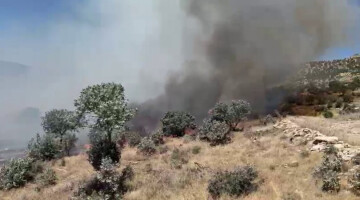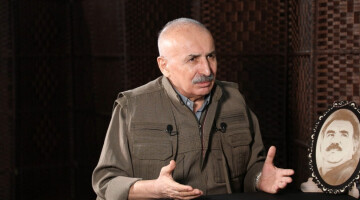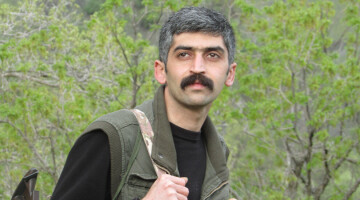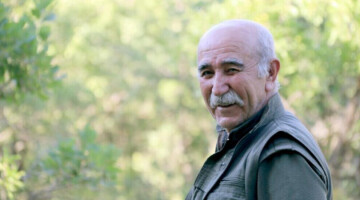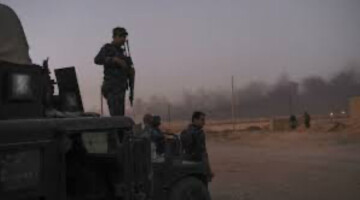"Without even guessing that my nylon socks would yet cause me much trouble on the journey I was about to embark on, and without even knowing one single word of the Sorani dialect, I confidently tread the path high up on the plateau of the proud and unfaltering mount Zagros. Or to be frank, at least I try to. I have embarked on a march for all the people whose villages were burnt to ashes and had to migrate, for the people who are left with no more expectations and esperance in life other than being able to provide the family with one meal a day, because they are Kurds. And because I am a Kurd I march. I march towards my new home, where I would spend years to come, and I would learn to feel myself not safe anymore without a weapon in my hands. I am marching towards Zap... I do not even attempt to ask 'how much longer will this route take?'. Since not before long it became more than clear to me, that this march does not intend to end anytime soon. Bearing in my chest the desire of those who crave to see the mountains I move on marching, hoping to take a break and put up my feet to feel the wind. Though I could not even guess how long the way yet promised to become, the gradual realization that it was certainly a very long way to go, made me - in order to be able to swallow some upcoming pain and to let my thoughts simply flow, in the hope that those whom I left behind would forever remember and talk about me fervently - finally..."
I regret to cut off the memoirs of comrade Mazlum at this point, who talked with us after we met about the days she joined the PKK and put it into following poetical words: "How I desire to be able to spare some time and write it all down on paper." As for now, questions are preying on mind. After all, there are some matters that create curiosity.
After tea break I suggest guerrilla Mazlum to jump into our work. While guerrilla Mazlum was sipping her warm drink during tea time, I already noted and recorded the in-depth discussion we had. As usual I made the opening. Though I must say, it started more like a question and answer session.
- Each time when the life of a guerrilla in the mountains of Kurdistan gets addressed, the first questions are all about the life on these mountains, the war and the difficulties that are faced. What can you tell us about all these points?
Mazlum: Some get bored.
- Bored? You mean they get disgruntled doing nothing?
Mazlum: Yes
- OK, do they say they are hungry?
Mazlum: No
- Coldness?
Mazlum: No
- Carrying too heavy backpacks?
Mazlum: No
And eventually Mazlum granted us a more detailed answer:
"At the very beginning they cope with understanding the struggle that is well organised, understanding the life per se. This is quite normal. They used to dream of marching on the mountains nonstop, fighting with the enemy, always on the move. They pushed the fact that such a stage needs time and education to the back of their mind. As a matter of fact, when you expect the education to be your opportunity to shoot an arrow at your prey, you will naturally be bored to death when facing reality. Some others are dining three times a day at a table. And again some others eat their three meals while walking a march. Of course one needs to accept to stay hungry, it often happens and when it happens it gets met without any complaints cheerily with hardiness. I can tell you, so that you get a picture, that there are such guerrillas who engage in clashes against the enemy totally worn out and terribly hungry, and after meeting again with their comrades plunge into mirthful discussions.
As if we always sleep on the snow...In coldness, under rain, in a tent... If you have one of those, what else would you want. If you don't have, then you will rest back to back with your comrade, pull up your legs, finished. It is of course a different lifestyle than that you have in a big city, but you have here a spirit that only knows happiness and enjoyment. In other words, easiness and hardship are relative. Every person faces hardship, difficulties in their life. Life has also here certain rules. The only difference is as follows: Here everyone abides by the rules with heart."
- They say that the guerrillas in Southern Kurdistan and those in Northern Kurdistan have different practices, they are regarded as the front gear and the back gear.
Mazlum: No
- They say that those guerrillas who are used to climb up the high cliffs love it most when they can march downhill.
Mazlum: No
- I have heard that the outfit of the guerrilla becomes an annoyance during summer time. Do you contemplate using thinner fabrics for summer? (I burst out like that to ease my gnawing curiosity, but regretted it without showing any sign of it).
Mazlum: (slightly annoyed) Shall our comrades run around bare, or what? From Southern to Northern Kurdistan, on the mountains and in the cities, in order to give adequate replies to the fascist state no matter where, we are in position everywhere. Every battle has a front. But that does not imply that there is a backdoor of a battle. The Turkish army is built upon the most modern military technology. When we fight against those robots, we deal with some other sort of problems, that's all.
To your other question, we usually answer that question with the joke "there no hillside for a bull to walk on". For many guerrillas it is much easier to walk the mountains upwards than downwards. Walking downhill is for many even more distressing, as it can get very heavy on the shin bones and due to the heavy backpack they carry on their backs. Going uphill is naturally not easy, but walking down is not easy either."
At the end she tells me yet this:
"Do not get me wrong, Mahir. I made a joke about the clothes. In the past the fabrics used for the uniforms of the guerrillas used to be mixed. Depending on where you were, you would have picked up the materials according to availability and the place you were and wore it. There are of course some advantages of thinner materials. But the disadvantages do outweigh. They tear faster apart for example in forests. The previously vastly diverse outfits of the guerrillas became very uniform, as we kept on sewing and stitching them. Like the example of the uniforms show, the guerrillas are not like they wrongly get interpreted. Against this fascist system they are such a force, that conducts a multifaceted fight. Not the term 'movement', not 'party', not 'community', not 'organisation', no term can do justice to the PKK's definition. It has such a form, that leaves behind all those aforementioned. What is left for us to call it, is 'force'."









